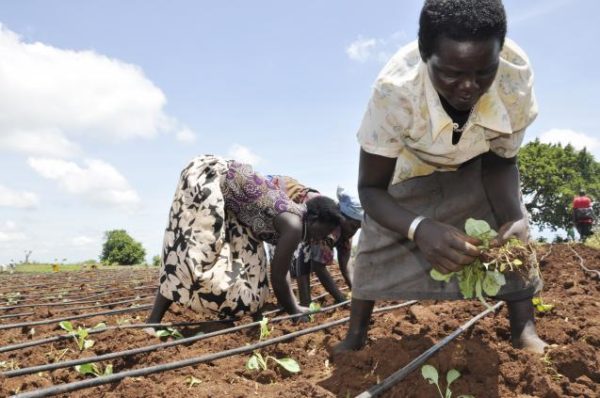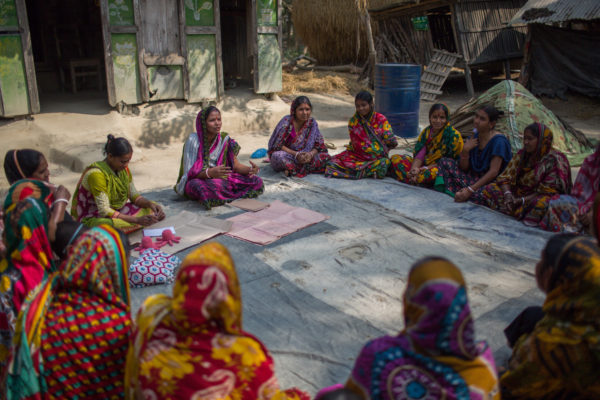1. Safe spaces for women increase the likelihood of violence being reported and punished
For many women who haven’t had the opportunity to get an education, reporting a crime or filing a legal complaint is a real challenge. This means many terrible offences never get reported – despite laws existing to protect their rights. Reflect groups offer the support of trained paralegals to these women and help bring them justice. These paralegals also push for policy change and reforms in legislation, monitor the implementation of laws, and hold governments accountable.
Women-only safe spaces are an integral part of ActionAid’s women-led approach to humanitarian response. They act as havens where women can access support and also provide information and feedback to ensure that their needs are being met during the initial emergency response.
In Nepal, we set up 23 safe shelter spaces after the 2015 earthquakes. These have now become permanent spaces where women are gathering to understand their rights and how to claim them.
2. Women become more independent when they have their own space
Cooperatives offer women the opportunity to gain new skills such as reading, writing, farming and sewing. This can provide an economic lifeline to women who have been forced to rely on other people, or who are escaping an abusive relationship. Cooperatives also give small loans to build a business, which can be paid back whenever the women are ready.
In 2010, Ajmira, from India, joined an ActionAid women’s group with other Muslim women to gain independence in their communities and received training in areas such as domestic violence, land rights, sex and sexuality, and communication. Ajmira says: “Before the group I wasn’t able to move freely and I didn’t know the village well, for instance, where to buy certain things. Now that I’m no longer dependent on my husband I can move freely, visit my friends, go to the market. The ideal society would be when all the women are able to come out of their homes freely and work independently outside of their houses.” She now chairs the group, which has 70 other members.

A women farmers cooperative in Kapchorwa, Uganda. Photo: ActionAid
ActionAid supports women in many communities around the world to form various types of cooperatives, from farmers cooperatives in Kenya to artisanal craft cooperatives in Myanmar, through which women are learning new skills, accessing new opportunities and empowering themselves economically.
3. Emergency response improves when women take the lead
One of the biggest outcomes of these women-only groups is that they now lead emergency responses, from damage and needs assessment through to procurement and monitoring of distributions. This model was first pioneered by ActionAid in Bangladesh a decade ago, and put into practice following the 2013 Cyclone Mahasen that destroyed more than 49,000 homes and devastated crops and livelihoods.
Some community members initially resisted it, but with decision-making power and funds in their own hands, women were able to show how indispensable they were to the emergency response.

Sabita Rani runs a training session on leading emergency response in disaster-prone Southern Bangladesh. Photo: ActionAid
When Hurricane Matthew struck Haiti in 2016, women-led cooperatives leapt into action. They distributed water, soap and hygiene kits, targeted 2,300 people through cash-for-work schemes – to clean out gardens and roads. They also set up safe spaces for women in four communities, where they could talk about experiences of violence and get psychological support. They also ran training to empower women with the knowledge of how to protect themselves better. This reached 24,000 people, provided 500 households with rechargeable lamps and helped repair a workshop that employed 300 people.
4. Boys and men are more engaged
Women’s safe spaces also open the door to conversations about the issues with boys and men. In one Haitian village, violence against women has been all but eradicated. “Because of our training, the men respect women now. Before, every man beat his wife. It was normal. But now – nobody. To convince men was difficult, but we changed the way they see us.” Boys and men are also now becoming powerful ambassadors for women. In Somaliland, for example, men are campaigning against female circumcision; supporting groups to lobby governments to help pass laws criminalising the practice and publicly declaring that they will not demand women have been cut before marriage.
ActionAid Australia stands with courageous women all around the world, who are coming together and taking collective action to claim their rights.
Join our network of activists in Australia and get behind them.
Together we can make a difference. You can also stay up to date with all our campaigns and projects by following us on Facebook and Twitter.